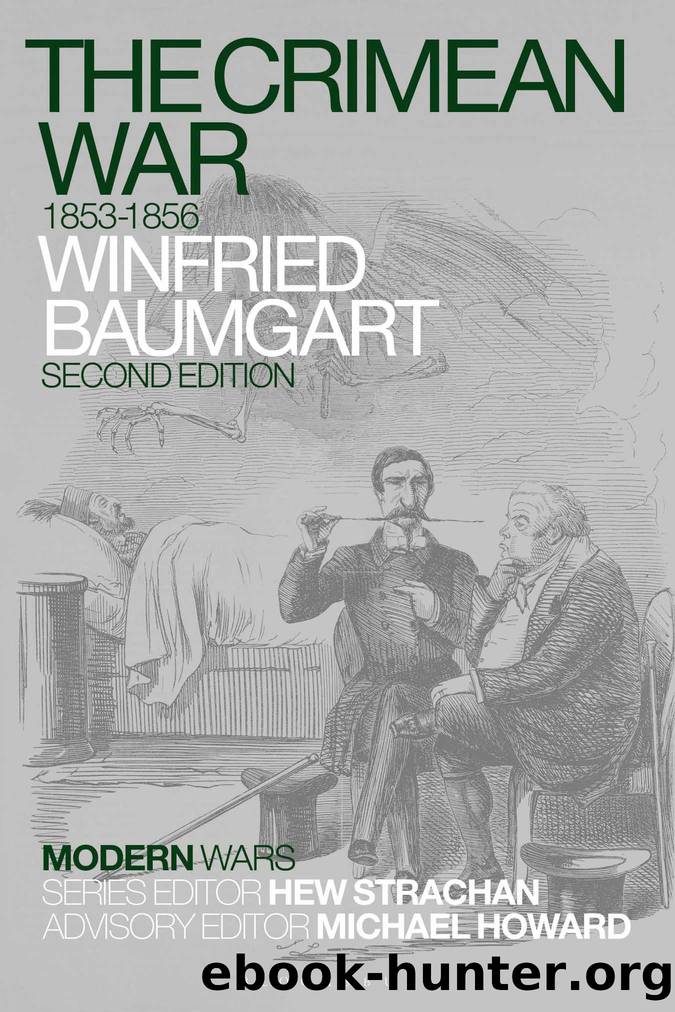The Crimean War by Winfried Baumgart

Author:Winfried Baumgart [Baumgart, Winfried]
Language: eng
Format: epub
ISBN: 9781350083462
Publisher: Bloomsbury Publishing
Published: 2019-11-02T00:00:00+00:00
FIGURE 12 The winter of 1854–5: the funny aspect. Punch 28 (1855), p. 64. University Library of Heidelberg, CC-BY-SA 3.0.
The men lie down in their tents, and to give ease to their feet take off their boots. The frosts, however, are sharp, and in the morning the boots are as hard as iron; there is no getting them on, nor is there a way to thaw or soften them.14
Sometimes ships arriving at Balaklava with vital necessities, like forage for the draught animals, were sent back to the Bosphorus because there was no space in the overcrowded harbour to unload them or – the most glaring example of red tape – the ships’ papers were not in order. In another case, iron beds arrived in one ship at Scutari and were held there for some time, whereas the legs had long been sent to Balaklava.
The utter helplessness of the British army was soon highlighted by the British press. The Times opened a series of articles on 19 December by sharply criticizing the government and its agencies for the abject situation in which the British army in the Crimea found itself. The paper had an on-the-spot correspondent, William Howard Russell, who delivered, in minute detail, reports on the misery of the army. Until that time The Times had supported the government in its efforts to show teeth to the Russian bear; at the beginning, in fact, it had goaded the government on in its opposition to Russian pretensions. Once the war had begun, the paper had sent a bevy of correspondents to the war theatre on the Danube, to Constantinople, to Scutari and then to the Crimea. Their reports were avidly read by a public eager for news from the Orient. When the Allies landed at Eupatoria on 4 September 1854 and drove the Russians away from the Alma, it was expected that the war would soon be over.
But the confidence of the public was shaken, when, at the end of September, the news arrived in Western Europe that Sevastopol had fallen, only for those reports to be quickly proven false. The spirit of the public was again rising when the bad news of the murderous Battle of Inkerman and of the havoc the hurricane had wreaked arrived. Then Russell’s articles about the disorganization of the army before Sevastopol led to a paroxysm of national hysteria. This in turn prompted a search for a scapegoat or scapegoats, which were found in Lord Raglan; his Adjutant-General, Major-General James Estcourt; the Quartermaster-General, Richard Airey; the various offices and departments responsible for the supply system; the government itself; and ultimately the outworn aristocratic leadership of the army and the state. On 23 January 1855 the radical Member of Parliament, James Arthur Roebuck, tabled a motion of inquiry into the conduct of the war in the Crimea, which a few days later swept away the government of Lord Aberdeen and brought a new administration, under the vigorous Palmerston, to power.
In comparison with the British army, the
Download
This site does not store any files on its server. We only index and link to content provided by other sites. Please contact the content providers to delete copyright contents if any and email us, we'll remove relevant links or contents immediately.
| Africa | Americas |
| Arctic & Antarctica | Asia |
| Australia & Oceania | Europe |
| Middle East | Russia |
| United States | World |
| Ancient Civilizations | Military |
| Historical Study & Educational Resources |
The Battle of Mogadishu by Matt Eversmann & Dan Schilling(612)
The Confidence Men by Margalit Fox(535)
The Spymaster of Baghdad by Margaret Coker(533)
A History of the Muslim World since 1260: The Making of a Global Community by Vernon O. Egger(516)
Jack the Ripper and the East End by Peter Ackroyd(473)
Empire of Fear: Inside the Islamic State by Andrew Hosken(465)
Islam At The Gates: How Christendom Defeated the Ottoman Turks by Diane Moczar(460)
The Crimean War by Winfried Baumgart(460)
The Afghanistan File by Prince Turki AlFaisal Al Saud(456)
The Jerusalem Diamond by Noah Gordon(454)
Akhenaten by Dominic Montserrat(443)
A Concise History of Greece (Cambridge Concise Histories) by Richard Clogg(441)
Israel: Ancient Kingdom or Late Invention? by Daniel I. Block(439)
The History of Jihad by Robert Spencer(430)
Enemy in the East by Rolf-Dieter Müller(429)
The Privatization of Israeli Security by Shir Hever(426)
Destroying a Nation: The Civil War in Syria by Nikolaos van Dam(425)
The Nine Lives of Pakistan by Declan WALSH(416)
The Dirty War in Kashmir by Shujaat Bukhari(404)
